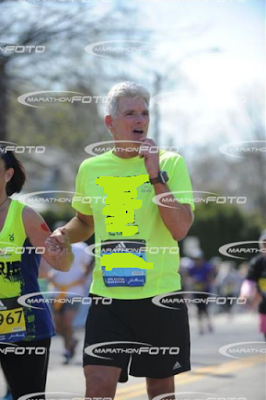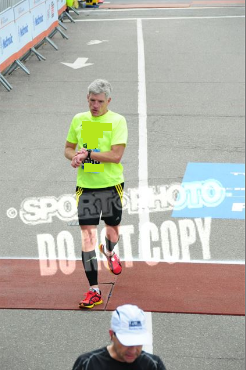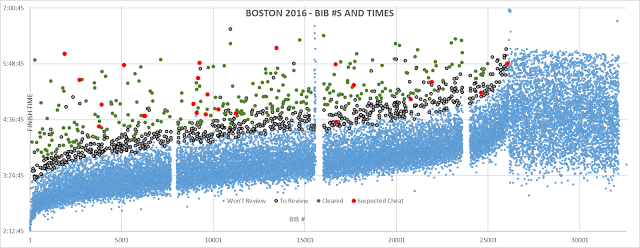I’ve been wanting To Write This Post For Quite Some Time. Whenever there is an article or an interview posted about the Boston Marathon results review, I get emails and comments about runners worrying that they will get flagged.
This will be an attempt to walk you through the process I use to prioritize the Boston Marathon reviews.
For the past 2 years, I have reviewed Boston results looking for those that cheated in order to run Boston. This includes course cutting, bub swapping, and using “bib mules” to run a qualifying time for them. The main assumption in how the review is prioritized is that most of the runners that cheat to enter Boston do so because they are unable to run a time fast enough to qualify legitimately.
The review is ongoing, and is kicking into high gear. I have been focusing on identifying those that have cheated in their 2017 Boston Marathon qualifiers. There are a few cases where I have emailed qualifying marathons on questionable runners, and I am following up on those cases.
But, since we are outside of the busy marathon season, this gives me an opportunity to finish the 2016 Boston Marathon review. This is still important to do because I have found that many of the runners I identify have cheated multiple times. By identifying cheating in prior races, it enables me to find other instances of cheating as well to prevent future infractions.
2016 Boston Marathon Review –
The first step in the review begins when bib #s are assigned. Once the bib #s are assigned, it enabled me to determine the qualifying time submitted by each runner. By looking up qualifier cutoffs for each corral, I was able to estimate qualifying time for each bib.
What this allowed me to do was to quickly identify the qualifying marathon for many of the runners. I have a database of historical marathon times which I can match up to the correct runner and estimated qualifying time. This saves me quite a bit of manual work in looking up qualifiers.
This chart shows Actual Boston times plotted against bib #s. Once I received the download of Boston results, I was able to quickly plot this out.
I’ve reviewed about 1/3 of the results that I plan to look at before it’s time to move on to Boston ’17 results. The red dots represent where cheating was confirmed. The green dots represent where runners were cleared, or there was not enough information to make a determination. The black dots still need to be reviewed. The runners noted in blue are not being reviewed. Their results are within the expected range.
Ideally, if I had unlimited time and resources, I would review more runners – or all runners so that I could better validate the prioritization.
A couple notes regarding the data. There is a band of runners starting at the 15500 range of bibs. These runners received entries without qualifying. They were mostly military or service exemptions. These entrants stand out immediately when looking at the graph.
Also, the charity entries start with bib #26000. You can visualize this clearly by looking at the top chart.
Refining The Process
Instead of just looking at the qualifying times to predict the runners’ Boston times, we went further.
With the input of others we developed predicted Boston times.
- Course Conditions – Average times were slower in 2016 (It was hotter). By starting with the average times looking at ranges of bib #s, we adjusted the finish time predictions.
- Qualifying Course – I utilized course rankings from findmymarathon.com to further adjust predicted finish time. Last year I found that I was reviewing a large # of runners from the downhill marathons (St. George, Revel Canyon, etc.). I made adjustments to the predicted finish times based on the difficulty of the qualifying race.
- Runner Demographic Data – One of the people that helped me with the data determined that if you chart gender separately, there is a different profile to the data. There was a larger variance between Boston Time vs. Qualifying Time for men than there was for women. This was accounted for in the predicted times. For Boston ’17 I will also incorporate age group data to further refine the predictions.


To support the blog, please consider a small contribution.
| One Time Contribution |
![]()


I get the reasoning, I hope you can find an easier way to rule out anomalies…In 2015 I ran Boston after qualifying in late 2013 (1st marathon, and a sub-3:30 to boot). When I ran Boston I had a recent death in the family so I stopped training… My Boston time was somewhere around 4:30 given the circumstances (and bad weather the morning of the race).
I guess it just sucks that there are so many people out that that ruin the fun in marathoning to pat themselves on the back for a time they didn't truly earn.
Love your blog. I ran Boston in 2010 and 2011 and know a couple people that actually did cheat (one bought someone's bib and another we confirmed course cutting). It's really upsetting for those of us that did train hard and actually qualify.
Your article about Jane Seo is fabulous. I posted on her instagram account and it wasn't very nice. This is not a one time behaviour but a well calculated out initiative. Horrible considering what a gifted runner she already was!!
Thanks for this post, explaining the process. Although it's a little creepy to find myself on your plot and know I was flagged, I can understand why, as I became injured during my training for Boston 2016 (my first Boston Marathon) but I was determined not to let it stop me from running the race. As it was, I spent 45 minutes in the med tent at Mile 25, but was happy to finish and get my medal and celebrate with my family who were cheering me on. I am still coming back from that injury and haven't run a race since, but I hope to someday return. As a "squeaker" who made it in by 28 seconds, I appreciate your efforts to keep the racing world fair.
I think your website is very interesting, and so are your investigation methods. I am not an avid runner, so I am a bit naive when it comes to the reasoning in your primary assumption. Why is it assumed that most people cheat on their qualifications time versus better finishing time? If winners receive rewards or sponsorships, wouldn't the impetus be to investigate the faster times?
It is very difficult to cheat and not be detected while running Boston. They have multiple timing mats, and it is point to point..so no real opportunity to cut the course. I investigate the runners that run considerably faster in their qualifier than their Boston time would indicate. So, I'm really investigating the qualifying race, and using Boston as an indicator race to prioritize the review.
The work you are doing is fantastic. As a runner I cannot reconcile how people can cheat in a race. I have Always though Of our sport as very honorable. And it really upsets me that people cheat their way to Boston. My running partner has been working her butt off to qualify. She has come close and will have her next shot in the next month. Seeing her disappointment is hard but what really impresses me is that she makes each race a learning and keeps on going to achieve her dream the right way. It takes a lot of commitment and sacrifice for a runner to achieve that goal. For a cheater to take a spot from another runner that has put the work, suffered through the lows, and risen to achieve their dream is ludicrous and dishonorable. Thank you for keeping the spots open for rightful runners.
Derek, I can give you a subject who you could investigate. He has now even appeared on TV, claiming "media narcissistis". Boston Marathon, hundred pounds reduction , etc. Stay tuned.